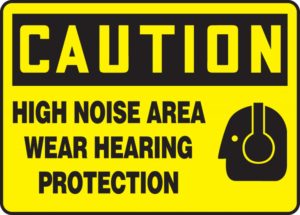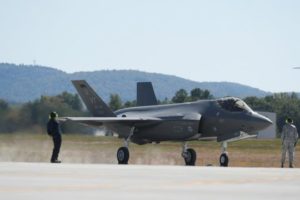South Burlington doesn’t want to foot bill for F-35 noise mitigation
VT Digger | 11 Nov 2019 | Aidan Quigley
Find the F-35 Opposition here: Save Our Skies Vermont
“South Burlington officials are worried their city might have to foot some of the bill for noise mitigation after the arrival of the F-35s, reviving a decades-long debate about airport governance.
While the Federal Aviation Administration is funding 90% of the noise mitigation programs, the funding source for the 10% local match is up in the air. The program is expected to cost between $50 million and $80 million and take around 20 years to complete, according to Nic Longo, the airport’s deputy director of aviation administration.

Some South Burlington city councilors say they do not want to contribute to that program without more of a say in the operations of the airport, which is owned by Burlington.
“I am adamantly opposed to the city of South Burlington contributing our property taxpayer money for this local match to support a Burlington managed-asset because the current governance structure does not give us any say,” South Burlington City Councilor Tom Chittenden said.
A fleet of 20 F-35s is expected to be in place by the end of next summer. The fighter jets will be nearly four times as loud as the F-16s they are replacing.
 Airport leaders say they are confident that a “creative” funding source can be found, and they will not have to ask the municipalities for funding for the programs, which will feature sound insulation and help selling homes if eligible residents decide to move.
Airport leaders say they are confident that a “creative” funding source can be found, and they will not have to ask the municipalities for funding for the programs, which will feature sound insulation and help selling homes if eligible residents decide to move.
Longo that he was optimistic the airport could work with utility companies to partner sound insulation and energy efficiency initiatives, using funds from the utility companies to pay for both.
Historically, Burlington has paid the 10% match for noise mitigation, but the city has not yet committed to paying in this case. This has left South Burlington leaders, including City Council President Helen Riehle, worried the remaining costs would fall to their municipality.
“We’re just caught in a situation of not having agreed to this and then being forced to pay for the consequences.” she said. “And that’s a lot of money.”
The South Burlington City Council discussed a draft of a memorandum of understanding among South Burlington, Winooski and Burlington on noise mitigation at its Nov. 4 meeting. The draft MOU lays out guidelines for collaboration on noi

se mitigation but does not address the founding source for the local match.
Riehle said the draft MOU didn’t go far enough to define Burlington’s role in noise mitigation funding. She said she was not “overly confident” that the cities would find common ground.
“We’re kind of in the middle, of ‘If you want this stuff, then you find the money’,” she said. “I don’t think they even strongly enough said we’ll help you look for it.”
Burlington Mayor Miro Weinberger was unavailable for an interview for this story, his spokesperson Oliva Lavecchia said. Winooski Mayor Kristine Lott did not respond to requests for comment.
In August, Weinberger said Burlington would work with surrounding municipalities to find appropriate funding sources for the local match.
Chittenden, who is a supporter of the F-35 basing at the airport, said Burlington should be on the hook for the noise mitigation payment.
“If they want us to pay, I want a say,” he said. “I’m happy to pay, but then I want a new governance model where we have a true regional authority over the long-term strategic decisions of that asset.”
Neighboring towns have long wanted more of a say in the operations of the Burlington-owned airport. But Burlington has resisted handing over any authority to its neighbors and Weinberger has said the airport is effectively managed as is.
Chittenden said he was worried that a dispute between the municipalities over where this local match is coming from could delay the implementation of the noise mitigation programs.
“My biggest concern is this might put the homeowners in each of these respective municipalities in a hostage position, where they’re going to want access to these programs,” he said. “If the municipalities can’t agree to this 10% local match, it will put them in further limbo.”
Longo said he did not think the tensions between Burlington and South Burlington would delay the start of the programs.
“Sure, these are tough conversations to have on a high level between the airport and municipalities,” he said. “But we work really, really well together.”
The collaboration with the energy companies is the airport’s top priority for the local match, Longo said. Under this program, the companies would tap into available revenue sources for energy efficiency programs and pair that with sound insulation, he said.
The airport is also looking at state and federal funding sources, Longo said.
But both of those possible funding sources come with major question marks.
Rep. Maida Townsend, D-South Burlington, said she was unsure how the appropriations committees would respond to a request for state funding as the local match. She said it was “the furthest thing from a slam dunk.”
“We all know that we don’t have pockets of money lying about, and both appropriations committees are very mindful of the way in which any dollar is spent,” Townsend said.

Townsend said she thought federal funding was the best possible source, and that she did not think residents of South Burlington and Winooski should have to foot the bill.
“It’s virtually the equivalent of pin money when you’re looking at the federal budget,” she said. “It is not pin money to us here in state as far as our state budget nor certainly for our local municipal budgets.”
David Carle, a spokesman for Sen. Patrick Leahy, D-Vt., said in a statement that federal funds usually cannot be used to match federal funds.
“While federal funds usually cannot be used to match federal funds, Senator Leahy’s staff and the entire Delegation have been consulting with local, state and airport officials, as well as with the [National] Guard, for some preliminary discussions, exploring how to support noise mitigation plans,” Carle said.
Burlington City Council President Kurt Wright, R-Ward 4, said he also believed the federal government would be the best funding source.
Wright said the administration owes the council a report on the status of the noise mitigation discussions, and he is eager to see where things stand.
“I understand why other communities wouldn’t be eager to pay for it, and of course, Burlington is not either,” he said. ”
Article from VT Digger
